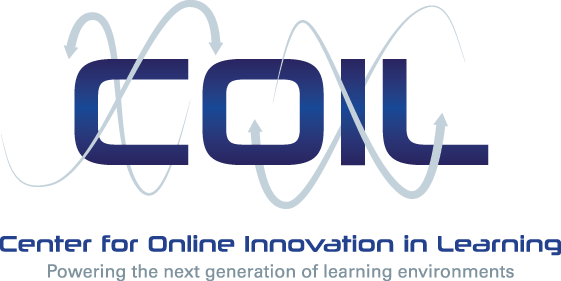This year’s Penn State Symposium for Teaching and Learning with Technology has grown from previous Symposiums. The event, held March 22, has expanded to the point where the event will take up two floors of the Penn Stater Hotel and Conference Center. One of the reasons this was possible was a sponsorship and partnership offered by the Center for Online Innovation in Learning (COIL).
“COIL is designed to bring people together who share interests in innovations that are likely to improve the teaching and learning process,” said Dr. Kyle L. Peck, Co-Director of COIL, professor and research fellow in the College of Education at Penn State University, and principal investigator of NASA’s Aerospace Education Services Project. “We are working hard to bring faculty, staff, students together from across Penn State locations and beyond to create a community of people who will think together and move both Penn State and online learning forward.”
The other co-directors of COIL include Dr. Fred Fonseca, associate professor in the College of Information Sciences and Technology; Dr. Bart Pursel, TLT faculty programs coordinator; and Dr. Larry Ragan. Along with partnering and co-sponsoring the TLT Symposium, COIL activities include the Research Initiation Grants (RIG) program; a variety of visiting scholar lectures, webinars, and workshops; and sponsorship of the Institute for Emerging Leadership in Online Learning.
COIL’s involvement in the TLT Symposium is not limited to sponsorship. They will be an active participant in the event, including an all-COIL session track and the COIL Links area, where throughout Symposium day RIG recipients will offer e-poster sessions on their projects.
An example of one of the sessions is “Using Online Learning to Improve Social Skills for Individuals with Autism.” Brad Zdenek, educational strategy and planning manager for COIL, said this session will discuss a unique way to use online learning technologies to improve social skills for individuals with autism. K. Suzanne Scherf, assistant professor of psychology, will present the session. “It’s a really interesting and somewhat out-of-the-box approach to addressing social skills issues that people with autism face,” Zdenek said. “This is a pervasive issue for people with autism, especially for individuals in more rural communities where some of the support services may not be as developed as in other places.”
Another session is “Making the Most of COIL RIGs,” which will be presented by Peck and Ragan. They will discuss successful strategies and techniques to secure a COIL RIG. The purpose of COIL RIGs is to provide “seed funding” during the development and proof-of-concept stages of research projects that show potential to advance online teaching and learning. The timing of the session, Pursel said, is perfect. “The next RIG cycle is coming up and proposals are due May 15,” he said. “So, the ‘Making the Most of COIL RIGs’ session is well-timed. If while at the Symposium people are inspired and get ideas about a project for a RIG, they have time to get a proposal ready.”
Peck noted that the COIL Links area would be a great place for people to learn more about COIL and to talk to people already involved. “The e-poster presentations will feature COIL-funded researchers describing the progress they’re making and the questions they’re exploring,” he said. “It’s a really good opportunity to meet the COIL researchers. One of our major goals is connecting people who share interests. So, I encourage everyone who will be at the Symposium to look at the list of e-poster topics and understand that they are not just people doing an isolated little study, but colleagues who are likely more than interested in collaborating with you.”
“The Symposium is such a great experience,” Peck added. “That’s why hundreds of people give their Saturday to get there to find out what each other is doing. It’s good to look outside of our own classrooms and offices and understand what’s going on around the University. But I see it as not just an opportunity to absorb, but to connect.”


